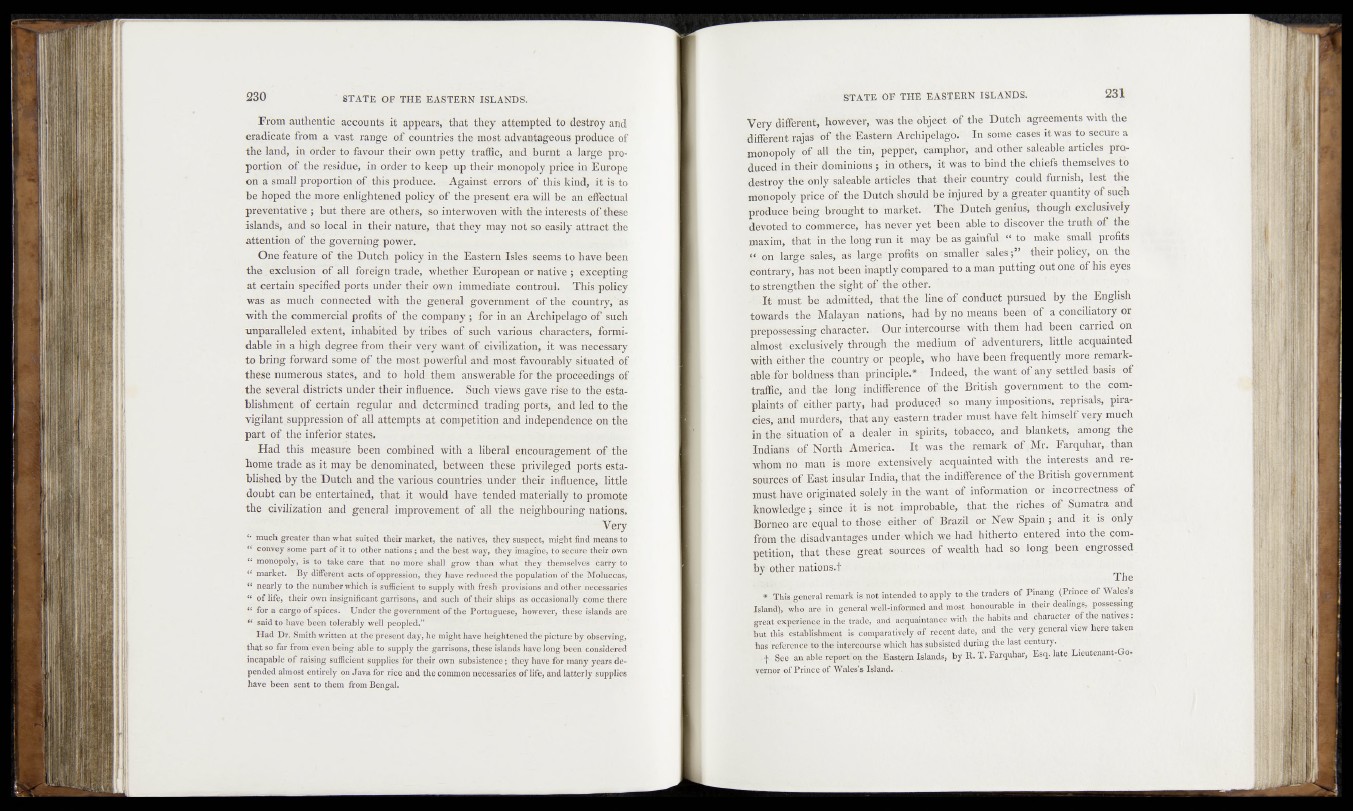
From authentic accounts it appears,' that .they attempted to-destroy and
eradicate from a vast range- of effirKies. the-most advantageous produce of
the land, jjjrv.order to .favour their' owffpetty-traffic,,-and burnt a-;laf-ge pyo-
portion of the residue, in .order to keep up -their,.monopoly price^in-Europe
on a smal| proportionoj^js, produce.-,yAgainst errors.of this kind,^Wtos
be hoped $re±mqretenlightened poiipyof the prespntrera will be/an effectual
preventative ; but there, are others, ySpunterwoven „with, the interests .of. these
islands, and so local in their nature* that they may not. .so-easily a tte st the
attention of the governing .powrey.
One feature of theDutch policy, in,the Eastern.Isles- seems.lo -have been
the „‘exclusion of all foreign trade, whfether.European or native; excepting
at certain/specified ports under their .own > immediate- controui. . Thisspolicy
was as mueh-connected, with the-general government oftthe '‘cpuntr^,^as'
with the commercial profits of the company j for in an Archipelago of sftfch
unparalleled extent, inhabited by tribes offsuch various characters1, formidable
in a high dvjfflffe; from, their very want o£^myilx^atiorq^it was necessary
to bring forward some .off the mostyjowerful and- most..favourably jsijt^Sdpf
these numerous states, and to holdifhem'- answerable fot‘the-proieee4dihgs of
the several districts under their influence'.' ^Spch^iSws gay!&'rise to|®'ei4eSta-
bhshment of certain regular and determined, trading .ports,,;and led. to-the
vigilant „suppression of, all attempts affcompetitjon: and i.ndenendenep.nTii the
part off ,the Inferior states. .
Had this measure been, combined with a.liberal encouragement ofijjj|he
home trade as it may be denominated, between .these .privi|eged"'portSIestablished
by the Dutch and Vhe various countries, under, tljeir. influence, little
doubt can be entertained^ that it--would have£jtended*materially to^promote
the civilization and general improvement /of alL the neighbouring nations.
''•^pefy
“ Much greater than what suited their market, the natives, thejcsuspect,' migEfEhlcf means4to*
“ Convey some part of it to'.other nations; and the best way, they .imagine, to secure Wmiram
“ monopolyig“to^take care that -im gpgje shall ‘grow than what'they themsfelveS1^ ^ ^ to
“ market. 1By different acts of oppression, they have reduced the population oftfte'Moluccas,
nearly to.-the number which is, sufficient to supply with fresTTpro visions and other necessaries
u , q^Efej. ith&ir own insignificant'garrisons,; ana such aif their 'ships as occasionally cSme'ih'ere
foracargo jaBjBp fetlh d eru h e |fovernnKslit ofrhp FoitHguieBe,' however, ibese island's are
41 said;t6' have been tolerably well peopled.”
Had Dr. Smith written at thcpresent day/he might have heightened the picture by observing,
that so far even beihg able to supply the garrisons, these islands have -long1 been’ considered
incapable Ol^rSikmji ‘sufficient supplies'for their own subsistence ;l they have for many years depended
almost entirSlytoh Java for'Jfce and the'common necessaries of life, and latterly supplies
have been sent to them from Bengal.
Very different, ■'•however,. was<the'^hj&^of the Dutch agreements with the
different teja s;offHhe!EastCfn Archipelago." In some cases it was to secuie a
'-the ■ tin/ 'pepper, camphor^ an d^othei-saleable articles produced
^n^theit dominions 5 in> othet's. 'it was tcffbind the chiefs -themselves io
'destroy-the onlyteleable articles that their country could furnish, ■ lest, the
monopoly price off the Dntchlshoi|E‘V 'i€j>yrfe'd ‘by a Sreater quantity of such
-pVSdnce being tb rb u g h tto ^ ^ e tW The Dutch genius*/though exclusively
-^gypted to^ommefces" haskieVer yet14bfeeti.'abfei to1 discover life truth'of the
maxim, that in {the'dpng runfft1 may-;b& as^gamfub make small profits
4v l!|l largeWales/' as«large^prbfid.sS*Qn fsmaller -1 sales" ^ 1 lKem-,pbhdy/ on the
contrary, has- ncMjfei^hftptly compared' to a man putting;.out,one of his eyes
-to Strengthen-the: sight o f f he other. *1 . ' ! r ^
It must be 1 admitted',-thlt4the line|ofi coffdhetpursued by the English
towards :fhfe • Malayan teario&s,i| had by'n’o meansTbeenroff a conciliatory or
^'repossessing- cffaracter i* with; them had; been • carried on
llmostrexclusively.^^ugh.rthe medium v.of-aldventurers-,Vlittle acquainted
with-eithe^d jcoun%vOrbpeople4, whc have been,frequently m'or.e- remark-
abicffor b’oldnesshhan -principle;* ' Indeed} tj^wantiofianyv, set‘tledf|basis of
.traffic/ and -the^LtogUintlifference; 6ffffbe' British' government teethe com-
plajnts’^^eitkdr party, had produced'^o many impositions/, reprisals, .piracies,,
and murders/ that anyreastefnittrader.mus^haym,ftlti^Hms,ftlf very, much
in theisikat-ioncof a deale'r,i in spirits*,-} tobacco,, a-hds blankets}, among the
'Indians > ;off^prth:Americas 1 -It- was^tMe .remark -of 4Mr. Earquhar,. than
wh'omj’n 6. fcnranfc is maore- extensively. acquainted with tbef interests and re-
%urces off East insular-India,-that-theiindifference of the British government
must.haye originated solelyiin the;want 'off info'rmation or&mcbrrectness
knowledge.; .since dt- is not improbable, .that' the .-.riches - of- £!um,atra and
Borneo-areleq’nab to those=?,either off Brazil qe, New Spa inand it«^d n ly
from fjhe disadvantages-uti’derf which we-had, hitherto' entered; into the competition,
that thbse,great spUrces' of wealth had so long, been engrossed
by; other■ nations.!: ? < ■■ 1
The
I # ^ g e n e r a l remark-is.not intended to apply to .the traders of Pinang (Erince of;. Wales’s
Island}//Who are in general well-mfornied and'.mose honourable in^feir^dealings, possessing
■“great ex^ ie rib e .in the tradej"'aik" ac#Mgtance'with .the habits and character q.ftfie natives;
.'&Vihis 'comparatively ’^ e d & t j
has referenc^t'o tl^i^tercourse which has'sub'sisted’ durih'g the- last e’entftry. 3 t ’ ,., ..,1
nEjpv See an able repnrtrop,theyEastern. Islands, .by R* T> Farquhar, Esq.-late, Lieutenant-Qop
yemor of Prince of Wales’s Island.-